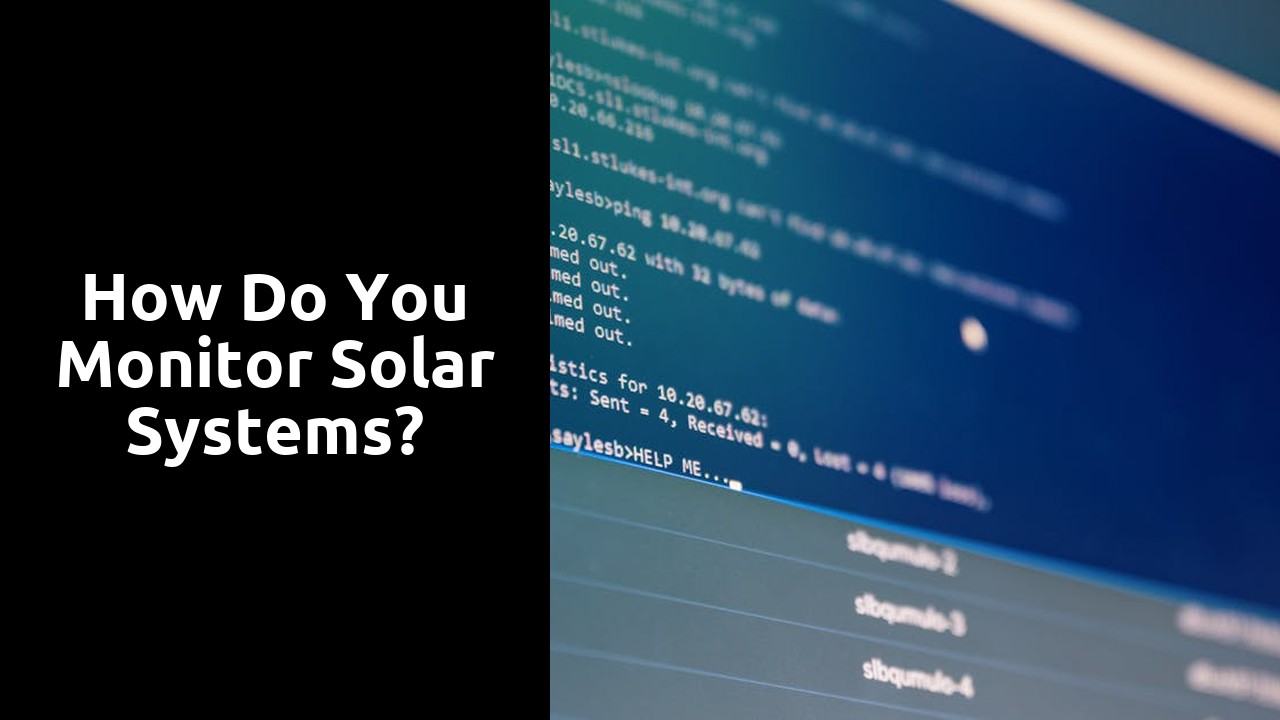
Table Of Contents
Benefits of RealTime Monitoring
Real-time monitoring of solar systems offers numerous advantages to both individuals and businesses alike. By tracking the performance of solar panels and other system components instantaneously, users can promptly identify any inefficiencies or malfunctions. This ability to react swiftly allows for timely troubleshooting and resolution, ensuring optimal energy production and cost savings in the long run. Solar Hot Water System Monitoring and Analysis become more effective and reliable with real-time data, enabling users to make informed decisions that enhance the overall functionality and lifespan of their solar infrastructure.
Moreover, real-time monitoring enables users to better understand their energy consumption patterns and make adjustments accordingly. By analysing real-time data insights provided by the monitoring systems, individuals can identify peak usage times and adjust their energy consumption behaviour to maximise the utilization of solar energy. This proactive approach not only contributes to sustainable energy practices but also leads to significant savings on electricity bills. Solar Hot Water System Monitoring and Analysis in real time empowers users to take control of their energy consumption habits and make environmentally conscious choices effortlessly.
Optimizing Energy Consumption
To enhance energy efficiency in solar systems, optimising energy consumption is crucial. By monitoring and analysing energy usage in real-time, solar system owners can identify patterns and make informed decisions to reduce wastage and maximise energy production. Solar Hot Water System Monitoring and Analysis can provide valuable insights into energy consumption patterns, enabling users to adjust settings and equipment usage for optimal performance.
Implementing energy-saving strategies, such as setting timers for heating elements or adjusting temperature settings based on usage patterns, can significantly reduce energy consumption in solar hot water systems. Additionally, leveraging smart technologies like Energy Management Systems can further enhance energy efficiency by automatically adjusting settings based on real-time data analysis. Through continuous monitoring and proactive energy management practices, solar system owners can achieve cost savings and reduce their environmental impact.
Solar System Monitoring Best Practices
Solar system monitoring is essential in ensuring the optimal performance and efficiency of solar energy systems. Regular monitoring not only helps in identifying any potential issues but also plays a crucial role in optimizing energy consumption. Solar hot water system monitoring and analysis are key components of ensuring that the system is operating at its full potential. By closely monitoring the performance data, such as energy production and consumption, system owners can make informed decisions to improve overall efficiency.
In addition to monitoring energy production, regular maintenance checks are vital in ensuring the longevity and efficiency of solar systems. Conducting routine inspections, cleaning solar panels, and checking for any signs of wear and tear can help prevent costly repairs and downtime. By incorporating solar system monitoring as part of regular maintenance practices, system owners can proactively address any issues that may arise and ensure that their system continues to operate at peak performance.
Regular Maintenance Checks
Regular maintenance checks are essential for ensuring the optimal performance and longevity of a solar hot water system. These checks should be conducted regularly to address any potential issues before they escalate. By adhering to a routine maintenance schedule, homeowners can mitigate the risk of costly repairs and ensure their system runs efficiently throughout its lifespan.
During maintenance checks, it is crucial to inspect all components of the solar hot water system, including the collectors, pumps, piping, and storage tanks. Any signs of wear and tear or damage should be promptly addressed to prevent further complications. Additionally, monitoring the system's performance metrics can help identify inefficiencies and make adjustments as needed for optimal functionality. Solar hot water system monitoring and analysis should be treated as an integral part of regular maintenance to maximise energy efficiency and overall system performance.
Common Challenges in Solar System Monitoring
Solar Hot Water System Monitoring and Analysis can pose various challenges for system owners and operators. One of the main hurdles faced is related to ensuring data accuracy and effectively interpreting the information gathered. Inaccurate data can lead to incorrect analyses and decisions, impacting the overall performance of the solar hot water system. Therefore, it is crucial for monitoring processes to be precise and reliable to provide an accurate representation of the system's operations.
Moreover, interpreting the data collected from Solar Hot Water System Monitoring and Analysis can be a complex task. Understanding the information presented, identifying patterns, and extracting insightful conclusions require a deep understanding of solar system operations. Misinterpretation of data can result in ineffective strategies for optimizing energy consumption and maintaining the system. Hence, it is essential for stakeholders involved in solar system monitoring to possess the necessary skills and expertise to make informed decisions based on the data at hand.
Data Accuracy and Interpretation Issues
Solar hot water system monitoring and analysis face various challenges related to data accuracy and interpretation. One common issue is the reliability of the data collected from the monitoring systems. Inaccurate or inconsistent data can lead to incorrect conclusions being drawn, affecting decisions related to system performance and maintenance.
Interpretation of the data is another critical aspect that requires attention. Ensuring that data is analysed correctly and that the insights gained are used effectively can significantly impact the efficiency of solar hot water systems. Without accurate interpretation, potential issues may be overlooked or misinterpreted, leading to suboptimal system performance.
FAQS
What is the importance of real-time monitoring for solar systems?
Real-time monitoring allows you to track the performance of your solar system continuously, enabling you to identify any issues promptly and maximize energy production.
How can monitoring help in optimizing energy consumption in solar systems?
Monitoring helps you understand how much energy your solar system is producing and how much is being consumed, allowing you to make informed decisions on optimizing energy usage and potentially lowering electricity bills.
What are some best practices for monitoring solar systems?
Regular maintenance checks, data analysis, and system performance evaluations are key best practices for effectively monitoring solar systems and ensuring their efficient operation.
Why is it important to conduct regular maintenance checks on solar systems?
Regular maintenance checks help in identifying any potential issues early on, ensuring that the system operates efficiently and prolonging its lifespan.
What are some common challenges faced in solar system monitoring?
Data accuracy and interpretation issues can pose challenges in solar system monitoring, impacting the ability to make informed decisions and optimize system performance.
